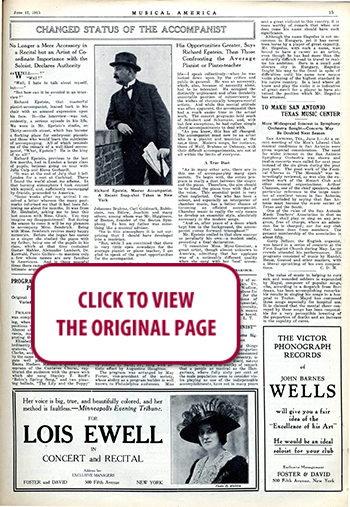 100 YEARS AGO...IN MUSICAL AMERICA (95)
100 YEARS AGO...IN MUSICAL AMERICA (95)
June 12, 1915
Page 15
CHANGED STATUS OF THE ACCCOMPANIST
No Longer a Mere Accessory in a Recital but an Artist of Coordinate Importance with the Soloist, Declares Authority— His Opportunities Greater, Says Richard Epstein, Than Those Confronting the Average Pianist or Piano-teacher
“WELL—?” “Well?” “Well, I hate to talk about myself, but—”
“But how can it be avoided in an interview?”
Richard Epstein, that masterful pianist-accompanist, leaned back in his chair with an amused expression upon his face. It—the interview—was not, evidently, a serious episode in his life. We were in Mr. Epstein’s studio, on Thirty-seventh street, which has become a flocking place for embryonic pianists and those who would learn the subtleties of accompanying. All of which reminds me of the remark of a well-liked accompanist, “What, Epstein? He is the king of us all!”
Richard Epstein, previous to the last few months, had in London a large class of pupils, betimes going on tour with Julia Culp and Elena Gerhardt.
“It was at the end of July that I left London for a rest at Carlsbad. There I found the world about me aflame. In that burning atmosphere I took counsel with myself, and, sufficiently encouraged by friends, proceeded to America.
“Some weeks after my arrival I received a letter whereon the many postmarks informed me that it had been following me about for months. It was from Mr. Zimbalist, asking me to tour this last season with Mme. Gluck. You may imagine my disappointment! But during the season to come it will be my pleasure to accompany Mme. Sembrich. Being with Mme. Sembrich revives many happy memories. Before she began her career as a singer she studied the piano with my father, being one of the pupils in his class, which at that time contained Gustav Mahler, Alexander Lambert, Dr. Kunwald, Paolo Gallico—to mention only a few whose names are now familiar to Americans. And in those peaceful times there came to our home—they were intimate acquaintances of my parents—Johannes Brahms, Carl Goldmark, Rubmstein, von Bülow, Joachim and many others, among whom was Mr. Higginson, of Boston, founder of the Boston Symphony. To him my father was something like a musical advisor.
“So in this atmosphere it is not surprising .that I should have developed into a musician.
“But, while I am convinced that there is very little open nowadays for the average pianist or piano teacher, I am glad to speak of the great opportunities for the accompanist.
As It Used to Be
“There was a time in this poor fellow’s life—I speak collectively—when he was looked down upon by the critics and public in general. He was an accessory, which, alas, because of necessity alone, had to be tolerated. He occupied the distinctly unpleasant and often decidedly unenviable position of subserviency to the wishes of chronically temperamental artists. And while this mental attitude was often apparent, the accompanist then had a much easier time in the actual work. The concert programs held much of Schubert and Schumann, and, with but few exceptions, he had rather simple chord accompaniments to deal with.
“As you know, this has all changed. The accompanist must now be an artist who is a pianist and musician at the same time. Modern songs, for instance, those of Wolf, Brahms or Debussy, with their difficult accompaniments, are not at all within the limits of everyone.
A True Duet
“As in many other arts, there are in this one of accompanying many open secrets. To begin with, the entire program is really a duet between the singer and the piano. Therefore, the aim should be to blend the piano tone with that of the voice. This essential point is very often neglected. One who has been a soloist, and especially an interpreter of chamber music, has a better chance of becoming an efficient accompanist. Chamber music is really the only means to develop an ensemble style, absolutely necessary in the modern songs.
“And so, after years of a doom which kept him in the background, the accompanist comes forward triumphant!” Mr. Epstein smiled in that slow manner so peculiarly his own—a modest smile, preceding a final declaration. “I remember Mme. Mysz-Gmeiner, a great artist, though almost unknown in America, admitting that her applause was of a noticeably different quality when she sang with her ‘best’ accompanist!” AVERY STRAKOSCH.




 RENT A PHOTO
RENT A PHOTO





